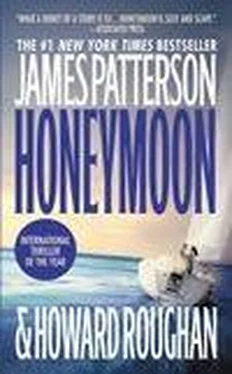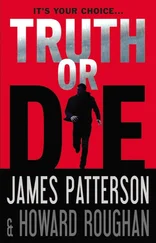Was cute even the word? It depended on the message, didn’t it?
I searched everywhere in the guest room, otherwise known as Marshall and Judy’s room. I went back downstairs and looked in the den. Finally I remembered. Duh!
I’m the one who had it.
I’d put it in a box of Susan’s things that I kept under our bed, the side she slept on, no less. Dr. Kline would have a field day with that one, wouldn’t he?
I hightailed it into my bedroom. Pulling out the box, I put on emotional blinders. I didn’t want to get caught up in the other items in it, the keepsakes. That had blubbering, crying mess written all over it.
Thankfully, the Bible was right on top. No digging necessary. I sat on the bed, turning to Deuteronomy and the Song of Moses.
Scrolling down the page with my index finger, I stopped on the missing passage, 32:35. I read it once, then twice.
To me belongeth vengeance, and recompence;
their foot shall slide in due time:
for the day of their calamity is at hand,
and the things that shall come upon them make haste.
I read it over again a few more times, although I didn’t know why. Maybe I was hoping that I was missing something, that there was a different interpretation.
There wasn’t.
No matter how you sliced it, I was being threatened. Someone had it out for me.
I think I need that other beer.
Chapter 25
NED SINCLAIR SAT behind the wheel of his stolen Chevy Malibu, watching from across the street as John O’Hara returned home.
He watched O’Hara get the mail. He watched him go inside.
Soon the sun would go down, and under the cover of darkness Ned would do what he’d come to do. What he was dying to do.
Outside the open windows of the Malibu he could hear the sound of a sprinkler head on a nearby lawn as it sprayed its water in a slow but steady circle.
Click, click, click, click …
It was the same sound, over and over and over. Relentless. Monotonous.
Music to his ears. As beautiful as a Brahms concerto.
Ned’s memories of being a mathematics professor at UCLA had waned to the point of being only quick, distant flashes now. What little he saw, though, was almost always the same. Equations. Equations everywhere. Those beautiful patterns of numbers filling up every inch of a blackboard, one line after another.
And always he’d be pacing before them—stalking them, really—with chalk in hand. He’d solve one equation and move on to the next, and the next, and the next.
Each one a victim of his genius.
A few minutes after nine, with no more daylight left in the sky, Ned stepped out of the car. Gently closing the door behind him, he glanced left and right to make sure he was alone, not being observed. The sidewalks were clear, there were no oncoming cars. A few porch lights glowed in the distance, but nothing more. Ned was all but invisible.
As though he wasn’t even there.
Slowly, he walked across O’Hara’s front lawn to the side of the house, where there was a small grass pathway between a wooden fence and some hydrangea plants.
He peeked in a bay window along the way, looking for anyone else who might be home, but he was pretty sure O’Hara was alone.
Ned had been parked in front of the house all day. He saw no one else coming or going, which was exactly what he wanted.
Everything was falling into place beautifully. Perfectly. Just as he’d imagined it all those days and nights at the hospital.
Approaching the backyard, Ned began to hear the faint sound of music. He recognized the song immediately. How could he not? His father used to listen to Sinatra all the time.
“The Best Is Yet to Come”? “Strangers in the Night”?
Ned smiled. No.
The song was “Call Me Irresponsible.”
Peeking around the back, Ned got a pleasant surprise. He wouldn’t have to bother getting into the house. O’Hara was sitting outside on his patio. He was drinking a beer.
Ned walked a few steps toward him, emerging from the darkness into the hazy glow of a nearby floodlight.
“Are you John O’Hara?” he asked.
He knew he was, but he wanted to make doubly sure. It was just like an equation. Always check your work. Then check it again. There can be no mistakes here.
O’Hara, startled, sat up quickly in his chair. He cupped a hand over his eyes for a better look at his uninvited guest. Ned Sinclair stared into those eyes.
“Yeah,” O’Hara said. “Who wants to know?”
Ned pulled a gun from inside his Windbreaker, the polished metal of the grip feeling like a big and wonderful piece of chalk in his hand.
“I’m Ned,” he said, taking aim at O’Hara’s head. “And you’re dead.”
Then he pulled the trigger and killed John O’Hara.
Book Two
What’s in a Name?
Chapter 26
THE WORDS PLAYED over and over in the head of a special agent named Sarah Brubaker. “There’s one more out there, and you’ll never find her,” the sick bastard had said. “That poor, poor little girl, she won’t last much longer. She’ll be dead and gone like all the others. She’s probably dead already.”
Agent Brubaker reached up beneath her sweat-soaked blouse. She sliced the straps of her bra with the blade of a Swiss army knife. Unhooking the front clasp, she then pulled the bra out from the bottom of her blouse. She stuffed it in her slacks along with the knife.
“What the hell are you doing?” asked Doug Trout, chief of the Tallahassee police department.
“Please get me two rubber bands,” Sarah said, ignoring his question, not to mention his quick peek at the way her blouse hugged the shape of her breasts.
Yep. She knew exactly what she was doing.
Trout disappeared into a supply room a few feet away while Sarah gathered up her shoulder-length auburn hair. She could hear the seconds ticking away in her head.
Except for the two cops stationed at either end of the hallway, the operations department above the main terminal of the Tallahassee Regional Airport had been cleared out. It was strictly NPO. Necessary personnel only.
As for the only nonpersonnel individual on the premises, his feet and hands were cuffed to a chair and table on the other side of the closed door behind her. A small, windowless conference room. A temporary jail cell.
For the past seven months, a real bastard named Travis Kingslip had terrorized the Florida Panhandle, kidnapping, raping, and murdering five young girls within a hundred-mile radius of Tallahassee.
Assigned to the case after the fourth girl went missing, Sarah had spent every waking moment trying to figure out who he was—and hoping that somewhere along the line he’d slip up and make a mistake. He never did.
Instead, some buffoon of a thief did it for him. A druggie.
A neighbor had called the police after spotting a man climbing through the basement window of Kingslip’s two-bedroom ranch house in the small town of Lamont, about thirty miles from the airport.
When officers arrived at the house, they not only caught the thief but they also caught a major break in the murder case.
Papered all over Kingslip’s bedroom were close-up photos of the breasts of underage girls—homemade digital prints—taken from every conceivable angle and cropped in a way that never revealed a face. It was like trying to identify a mannequin.
At the very least, they had a child pornographer on their hands. But then Sarah arrived and noticed the kidney-bean-shaped mole in one of the pictures. It matched the description given to her by the parents of one of the missing girls.
Within an hour, Sarah and half the Tallahassee police force were storming the tarmac at the airport in 102-degree heat. Kingslip, a baggage handler, confessed on the spot. “All you had to do was ask,” he’d said.
Читать дальше












